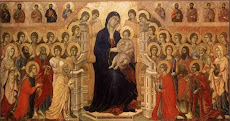Beliefs in evil spirits/demons/witches in the modern era:
One can believe in something as a truth for the sake of that truth (Whether I like it or not, these things exist). But why go on believing in them? Why, like the leader I mentioned in the previous post, take such pleasure in believing in them?
In part, panic will push people to look for explanations wherever they can. I’m reminded of a scene from All Creatures Great and Small (1978) where James Herriot is furious with a local older farmer for pushing folk remedies on the young farmer that Herriot is trying to help. Herriot’s fury is fueled by his frustration, namely (prior to World War II and antibiotics) the fact that he can't offer anything much better.
In part, beliefs in a cosmically evil world persisted in the colonies because Calvinism removed Saints (an entire pantheon of beings between humans and God) from the top-down part of their belief system, which removal created a void. Puritans filled that void with demons. In some ways, Calvinist beliefs in the less positive denizens of the unseen world fell into the above category: Demons exist, yes, but one isn't supposed to do much more with them than resist their influence. Magic is wrong, not because it is fake but because it takes one's eyes off God.
The Enlightenment suggested another approach. Demons were irrelevant. As Jonathan Edwards preached, a believer should focus on grace, immediate sanctification, and a reasonable God.
I suggest, however, that for many believers the Enlightenment wasn't that different from the practice (which was resisted at the time of the Reformation) of removing Saints in the first place. Beliefs in cosmic evil were passionately revived during the late eighteenth to nineteenth
centuries alongside Millennialism. Astrology, magic, miracles, supernatural
encounters, visions, dreams—the good and the bad of transmundane
beliefs—resurged in a push back against Enlightenment thinking. The feeling was that so much orderliness was stripping humans of the full spiritual experience.
Consequently, in recent years, some writers have blamed the Enlightenment for ruining religion while Enlightenment believers have blamed religion for keeping everyone thinking medievally.
I think the argument is as pointless as atheists arguing with fundamentalists. The Enlightenment—a highly varied movement itself—underscored the concept of a rational and reasonable deity. The associated assumptions impacted the entire human experience from church organization to charity work to scripture reading. Many things people take for granted—such as forensics as evidence—are both older than the Enlightenment and were encouraged by the Enlightenment. Theology, likewise, has always focused on producing a coherent explanation of God and God's acts.On the other side (supposedly on the other side), belief in things beyond the observable senses is part of the human condition. Hence, the Satanic daycare accusations that took off in the 1980s. And I haven’t even discussed The Exorcist! (I’m not going to.)
There's a reason human beings can imagine and plan and create connections between people and events and objects. They can always imagine more, much more!
In addition, there are far too many instances of human beings
taking observable evidence as the end of a conversation and being wrong for a sensible person not to accept that life is more complicated than what is immediately on the table.
Blaming the Enlightenment OR blaming religious beliefs is a waste of time. Anything can be turned into a fetishistic object of worship, including non-supernatural events and people and things. Better to accept both sides of the human experience and THEN try to come up with a decent solution.
Next: The Book of Mormon and evil spirits/demons/devils...



No comments:
Post a Comment